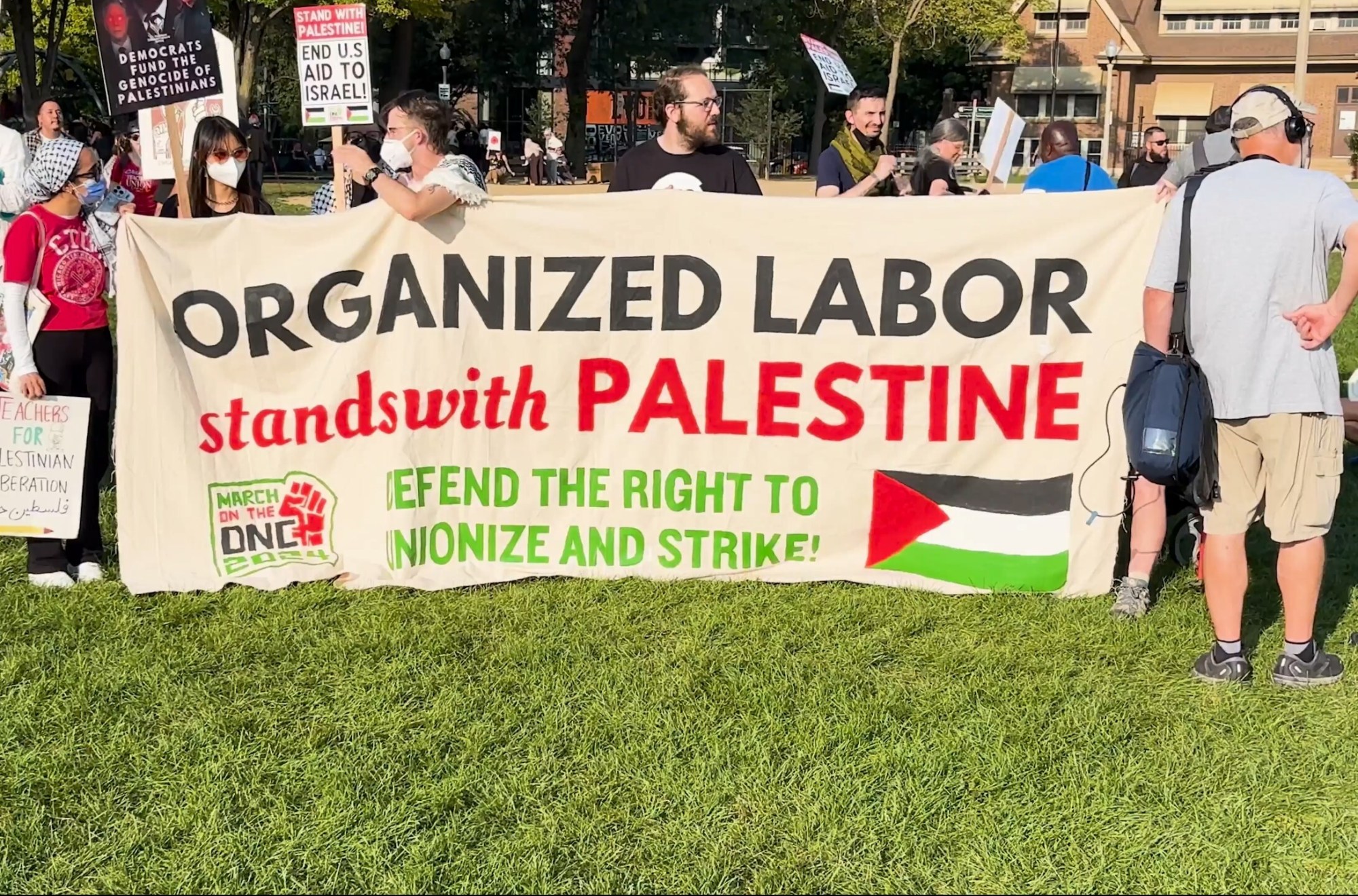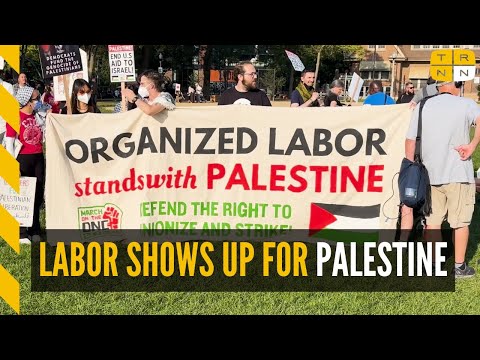On Aug 22, dozens of labor organizers and allies joined the thousands of demonstrators marching within sight and sound of the DNC for the final March on the DNC action in Chicago, Illinois. The Real News spoke with union members who showed up to demand a permanent ceasefire in Palestine and an end to military aid for Israel about why they felt it was important for labor to be represented in the movement for Palestinian Liberation.
Video/Post-Production: David Hebden
Transcript
Mel Buer: We’re here at the fourth and final day of the Democratic National Convention, outside at Union Park for the final night of the March on the DNC. For the last week, we’ve seen thousands of demonstrators stream into this park, all demanding an arms embargo on Israel and a ceasefire — Permanent ceasefire — In Palestine.
Today, a large contingent of the Chicago Labor for Palestine Coalition have come out today to support the March on the DNC and its demands. We talked to a number of members of various unions about why they’ve come out today, and what they think labor can do for this movement in the future.
So, we see a huge crowd out here, the Labor for Palestine, particularly the Chicago Labor for Palestine. Why is it important for you to be out here, part of this group, and be represented at the march today?
Speaker 1: Well, Palestine is a labor issue because we should care about humans no matter what part of the world they live in. And what’s happening in Gaza and the West Bank now is a crisis, a humanitarian crisis. It’s a genocide that our tax dollars are paying for. So, there’s just that. It’s wrong on that standpoint.
The fact that it’s our tax dollars paying for it is even worse. The fact that we’re spending money on that. And in this country we have people who don’t have healthcare, that don’t have proper housing, they’re struggling to buy milk and eggs because prices are through the roof, rent is through the roof, and pay has not gone up with that.
And so, there’s money to destroy, to maim, to murder children, women, men in Gaza and the West Bank, and yet we don’t have money for healthcare. We don’t have money for housing, transportation, all the things that people in this city deserve and work very hard for.
So, I think those are reasons why we’re out here today. We want to stop arming Israel. We want an immediate end to aid to Israel. And we should be funding our communities and healing them, not providing genocidal war funding.
Speaker 2: I think witnessing a genocide unfold in real time on my phone has permanently changed me. And I can’t look my students or my children in the face, after knowing intimately what dead toddlers look like, and then seeing… I would doomscroll through my phone every night and then sneak into my children’s room to give them a kiss and make sure they were okay. And that’s just not a world that I can be okay with. I cannot look in the faces of my children and my students if I’m not doing something about it.
Speaker 3: Well, in my experience, I was on strike last year. I’ve been to many picket lines. Workers stand in solidarity with other workers around the world, and we’re just here to show our support for the Palestinian trade unionists, and also the people of Palestine and their right to self-determination.
And we just want to make sure that our presence is known, that it’s here. We support a ceasefire, we support an end to sending military aid and weapons that contributes to the genocide in Gaza.
It’s our tax dollars that are funding this. That’s the way I talk about it with people, with other workers, that might not understand or know exactly what’s going on. They’re like, why does this matter? Why should this matter to me? I’m like, well, we look at our neighborhoods and our communities, and my daughter’s school’s falling apart. And they say, oh, there’s no money to fix anything in our infrastructure. But we have billions of dollars to fund a genocide, and that’s not right.
Mel Buer: As a member of the UAW, how do you feel about your international president not only speaking at the DNC, but also continuing to advocate for a ceasefire and an arms embargo in Israel?
Speaker 3: Yeah. Well, I’m glad that he did mention that. Just wish it would’ve gone a little bit further. Even with AOC’s remarks today, the uncommitted delegates are demanding to have a Palestinian voice in the DNC, in the convention, and they were denied, so they’re doing a sit-in. One of my friends, who’s a delegate, is also there, participating.
And I wish they would’ve not just mentioned a ceasefire, but also ending the aid to Israel, ending the… No more bombs, no more weapons, no more money to fund this war, or this genocide.
Mel Buer: So, the last four days have been full of these incredible marches. I’ve been out here every day since Sunday watching these thousands of people walking in the streets. How does it feel, on a personal level, to be part of this movement?
Speaker 1: It’s inspiring. The Democratic Party does not talk about Palestine. I was listening to one of the panels chaired by Zogby, and the only time Palestine ever got mentioned was when Jesse Jackson was running for president as part of the Rainbow Coalition. It’s absolutely stunning. I had no idea. It’s fitting. Both parties have backed Israel to the hilt because it’s part of the US international policy and project for many years. So it’s heartening that those ideas are being challenged by so many people.
The fact that they’re having to talk about it now, within the DNC spaces and without the DNC, is a testament to all the work that people are doing. Because they’ve been moved by what they’re seeing in Gaza, they’ve been moved by what they’re seeing in the West Bank, they have to act. They have to get out in the streets. And so, it’s inspiring to me that people are seeing that regular people can stand up and make a difference. At least it’s just getting the issue to the forefront.
I think the next step for us is, how do we start to actually put pressure on the decision makers to do what’s right and stop arming Israel immediately? That’s going to be the more difficult challenge. Because we’ve had these protests, we’ve had mass movements in this country since October.
In my own union, Chicago Teachers Union, Nov. 1 at our House of Delegates, we passed a resolution calling for a ceasefire, which is one of the earlier unions to do so. But the city of Chicago also passed a resolution calling for a ceasefire, but obviously Netanyahu and his war buddies, war criminals, really, don’t care about that.
And so, the question, I think, for us, as workers in this country, as citizens, as activists, as people who live in the city, not just citizens, but anybody, how do we take it to the next level so that we can actually stop this funding and this material support for this awful genocide?
Speaker 2: I think labor has a unique ability to mobilize a lot of people, and a lot of people quickly. As a proud CTU member, I have seen the ways that we can get tens of thousands of people into the streets at a moment’s notice. And I have also, having been teaching for about a decade, and involved in CTU for about a decade, have been really proud to see the ways that CTU has evolved over the years, evolved in our politics, evolved in our engagement with our communities, and I am just excited to be part of this campaign.
Mel Buer: As a member of the labor movement, do you have any thoughts about how the labor movement can continue to put that pressure, or escalate that pressure?
Speaker 1: Yeah. I think one of the things we’ve done in the Chicago Labor Network for Palestine is start with education. The mass media, the politicians, give this story that this all started on Oct. 7. Hamas just sprung out of the ground out of nowhere and launched this unprovoked attack on Israel. And that’s just fiction. This goes back to ’48. It goes back even before then, earlier, if you really want to get into history.
So, one of the things we’re trying to do is just educate people, saying, here’s actually what is going on. We had a forum over at the Chicago Teachers Union. We brought educators, Palestinian educators, talking to about 150 unionists about what the history of Palestine is, what the history of Israel is, how Zionism is not a religion, but a political project, and how we as people in this country should learn what our country has supported.
Why is it that we should be against political Zionism? Why we should oppose funding the state of Israel. And I think those kinds of things are a start to get people’s minds changed, to get them educated.
And then, I think, further, we have to do things like take action within our unions. Are our unions investing in Israel? Are there pension funds that our unions contribute to that may be associated with either war profiteers or the state of Israel itself? Is there work action that we can take, like docks that are providing shipping services to bring material to Israel’s war?
Those are the kinds of things I think we should start to talk about and organize and activate around now to support this Palestinian struggle.
Mel Buer: Any of the delegates, the attendees at the DNC, the Harris campaign, is there a message that you would like to send to them as a member of the labor movement also involved in this kind of work?
Speaker 3: Yeah, for sure. To demand that, not only to call for a ceasefire, but to also stop sending aid to Israel. Stop sending bombs and weapons.
We want amnesty for all our newcomers, our new arrivals. I was just at a rally in Lockport for Julian Electric. They’re trying to join the UAW. Most of those workers are undocumented, so we need to stand in solidarity together, because all these issues are related, and let’s hold these electives accountable.
They’re not going to get a guaranteed vote from everyone just because we don’t want Trump. Obviously we don’t. Nobody wants another four years of that nonsense, but it’s sad that these are our only two options. I see Kamala as just Biden 2.0, and we need to have a Labor Party. We need to have other parties that can have candidates that people will want to vote for, and not just have this two-party system.
Maximillian Alvarez: Thank you so much for watching The Real News Network, where we lift up the voices, stories, and struggles that you care about most. And we need your help to keep doing this work. So please tap your screen now, subscribe, and donate to The Real News Network. Solidarity forever.



